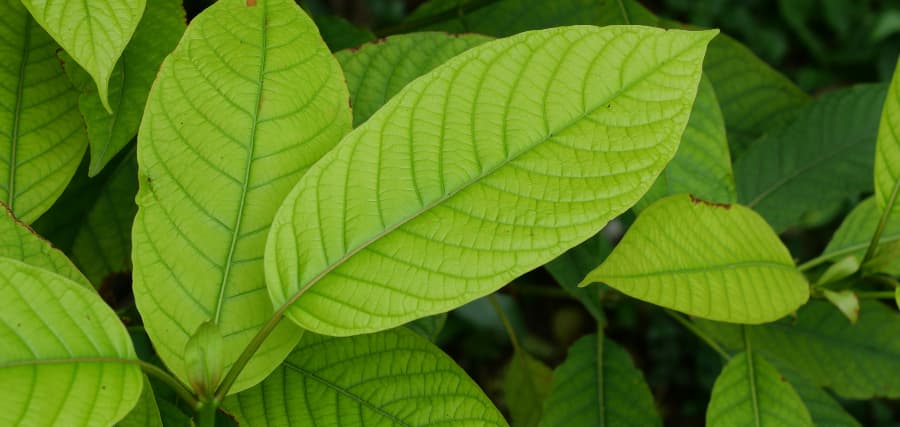You may have heard of kratom. It’s becoming more and more popular in alt medicine circles. It’s said to help with pain and have some mood enhancing properties. Pain management, relaxation, and some use kratom in addiction treatment to theoretically help alleviate withdrawals.
Of course, it is psychoactive. It contains alkaloids, like mitragynine and 7-hydroxymitragynine, which interact with opioid receptors in the brain. At lower levels, people report that it can give more energy and alertness—maybe some social effect and motivation. At higher levels, it can also produce effects of euphoria. Kratom can influence a person’s perception, mood, cognition, behavior, and consciousness.
As a psychoactive substance, addiction is possible—with sustained use, it is highly likely.
Kratom Maeng Da is the most potent strain of kratom.
Where Does Kratom Maeng Da Come From?
Kratom Maeng Da is a strain of the Mitragyna speciosa tree native to Southeast Asia, known for its potent and distinctive properties. Kratom comes in various strains, each with unique effects, and Maeng Da, often dubbed the “king” of kratom strains, is considered one of the most potent. It’s used traditionally for its stimulant effects and as a pain reliever, but its legality varies globally due to concerns about safety and potential for misuse.
Potential Risks of Maeng Da Kratom
Maeng Da Kratom contains several psychoactive components, with mitragynine and 7-hydroxymitragynine being the most significant. As mentioned before, these substances interact with opioid receptors in the brain, providing stimulation at lower doses and pain-relieving and sedative effects at higher doses. However, the impacts can vary, influenced by dosage, frequency of use, individual physiology, and the presence of other substances.
Despite its traditional use, Maeng Da carries potential risks and side effects. Short-term side effects may include dry mouth, sweating, increased urination, loss of appetite, and more. Long-term or heavy use of Maeng Da can lead to more severe consequences, including weight loss, and insomnia.
Addiction is potentially the most serious negative effect, as once a person is addicted to kratom Maeng Da, the best course of action for recovery is an addiction treatment center that specializes in inpatient services.
Individual factors significantly influence the effects and risks associated with Maeng Da. The dosage and frequency of use, as well as personal health conditions and genetic predispositions, can all impact an individual’s experience with this substance.
What Is Kratom Maeng Da Addiction Treatment
The use of kratom, including Maeng Da, for addiction treatment remains a contentious subject. Some research suggests that kratom could help with opioid withdrawal symptoms, and anecdotal reports often highlight its potential utility. However, the lack of comprehensive, large-scale studies and the risk of swapping one addiction for another make this a controversial topic. Legally, the situation is complex too, as kratom regulation varies widely, even within the same country.
It’s important to understand that while Maeng Da might offer relief from withdrawal symptoms, it also carries its own risk of addiction. Misuse can lead to a kratom use disorder, marked by a failure to fulfill daily obligations, cravings, and withdrawal symptoms when trying to stop use. Consequently, professional supervision is crucial when considering kratom or any potentially addictive substance as a therapeutic aid.
How to Treat Kratom Maeng Da Addiction
The safest path to overcoming addiction typically lies in established, evidence-based treatments. These may include medications approved by the Food and Drug Administration, counseling, cognitive-behavioral therapy, and participation in peer support groups. Professional treatment centers like Covenant Hills Treatment Center offer structured environments that address not just the addiction but also any co-occurring mental health conditions and provide tools for long-term recovery.
While Maeng Da Kratom has traditional uses and some potential therapeutic benefits, it also carries significant risks, including addiction. If you want to talk to someone about kratom addiction, or any substance use disorder, call our team today. Our addiction specialist are able to answer your questions and offer guidance on the steps available to you or your loved one. Call today: (800) 662-2873.
.








